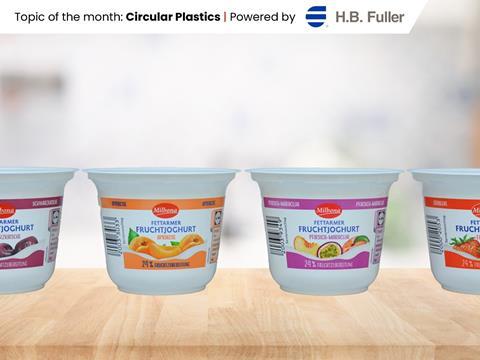
INEOS Styrolution has completed a collaborative project to mechanically recycle polystyrene into yoghurt cups, set to hit Lidl supermarket shelves early this year.
Registered as a novel technology in line with EU 2022/1616, INEOS Styrolution’s “super clean” purification process is believed to result in recyclates that are suitable for food contact – a process that was previously limited to PET bottle recyclates, the company says.
It involves multiple steps ranging from deep NIR sorting, including object recognition, through to hot washing, flake sorting, melt filtration, and pelletizing.
Reportedly, the recycled material provides the same physical properties as conventionally produced polystyrene. INEOS Styrolution claims that the material and resultant cups have undergone ‘intensive’ quality controls, as well as ‘detailed’ analyses to complete an EFSA evaluation.
It is also believed that the environmental footprint of a recycled cup would be ‘significantly lower’ than that of a conventional polystyrene cup.
In spring 2024, dairy manufacturer Unternehmensgruppe Theo Müller worked with INEOS Styrolution on an initial consumer test to gauge consumers’ perceptions of cups containing recyclate. An INEOS canteen distributed ‘several hundred’ yoghurt cups made of recycled polystyrene to volunteers.
90% of testers said they would buy the product, while also accepting that a recycled cup could appear in different colours to the plain white of virgin polystyrene.
“Polystyrene arrived in the champions league of recycled food contact materials,” explains Dr. Frank Eisenträger, ECO & market development manager at INEOS Styrolution. “It will enable producers to meet the new requirements of the new EU directive PPWR for packaging and packaging waste.”
Lena Lembach, senior packaging development at Unternehmensgruppe Theo Müller, adds: “This is a milestone achievement on our common way to perfect circularity for polystyrene cups and towards fulfilment of the PPWR requirements as well as our own CO2 footprint reduction targets.”
Back in the summer of 2023, INEOS Styrolution worked with TOMRA and EGN Entsorgungsgesellschaft Niederrhein to open an advanced mechanical recycling facility; the partners planned to convert an annual 40kt of post-consumer polystyrene into recycled polystyrene for food packaging. The plant would also utilize the “super clean” process.
Additionally, a form-fill-seal yoghurt pot containing 98.5% polystyrene was previously developed by Plastiques Venthenat, Amcor, Olga, Cedap, and Arcil-Synerlink in hopes of streamlining the sorting and recycling process. It was subsequently nominated for a Sustainability Award, and became one of two winners under the Pre-Commercialized Recyclable Packaging category.
Earlier still, COEXPAN’s innovation and technology centre, INNOTECH, completed a trial to source polystyrene grade from household food packaging waste and use it to produce yoghurt pots.
If you liked this story, you might also enjoy:
The ultimate guide to the Packaging and Packaging Waste Regulation in 2024
How are the top brands progressing on packaging sustainability?
Sustainable Innovation Report 2024: Current trends and future priorities
Everything you need to know about global plastic sustainability regulation














No comments yet